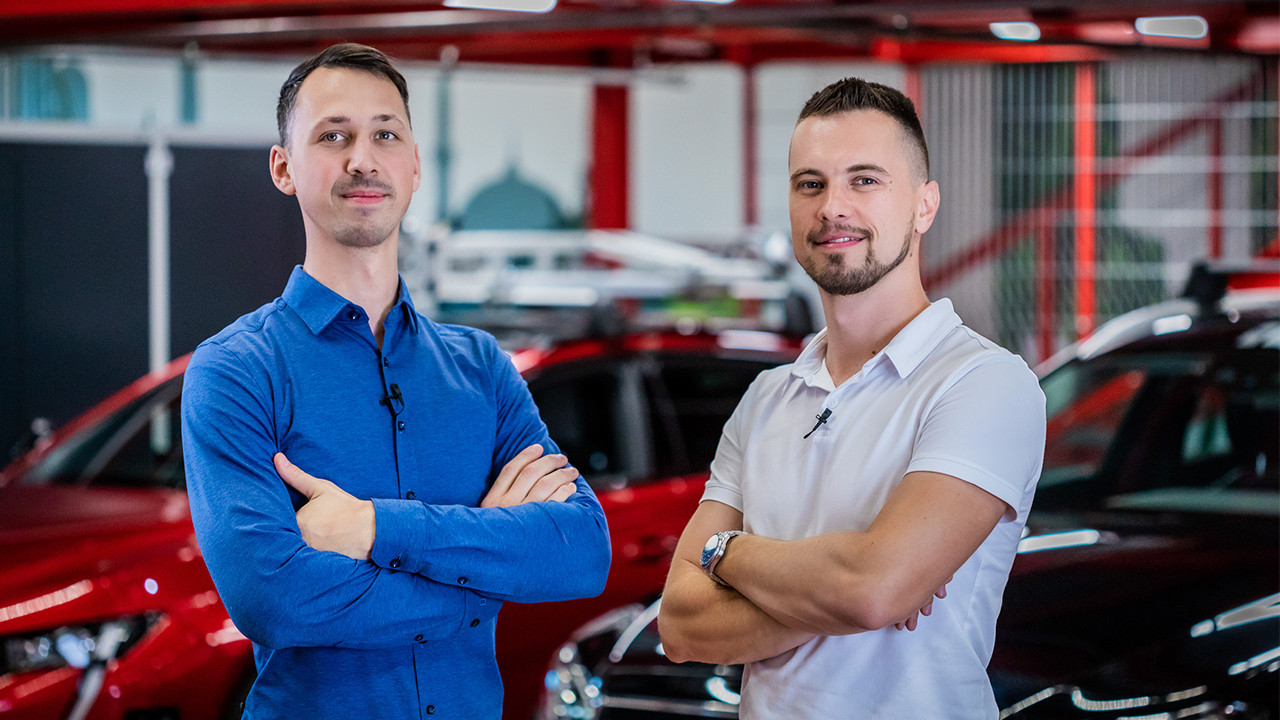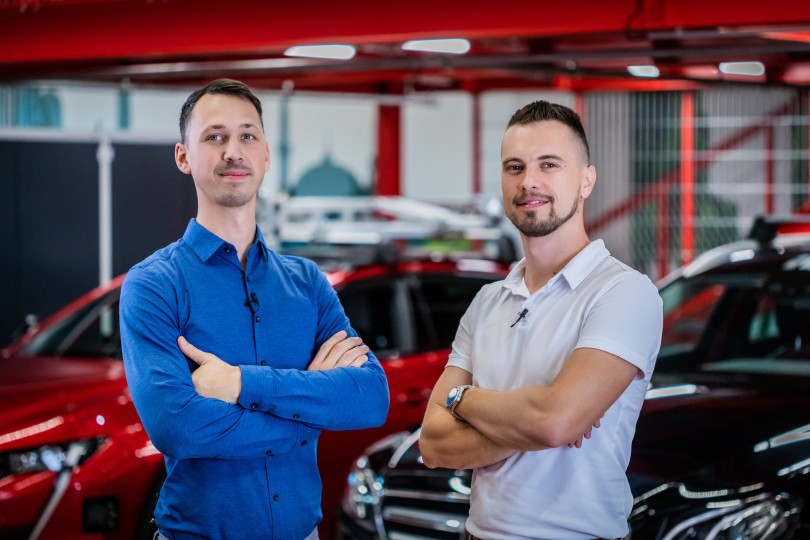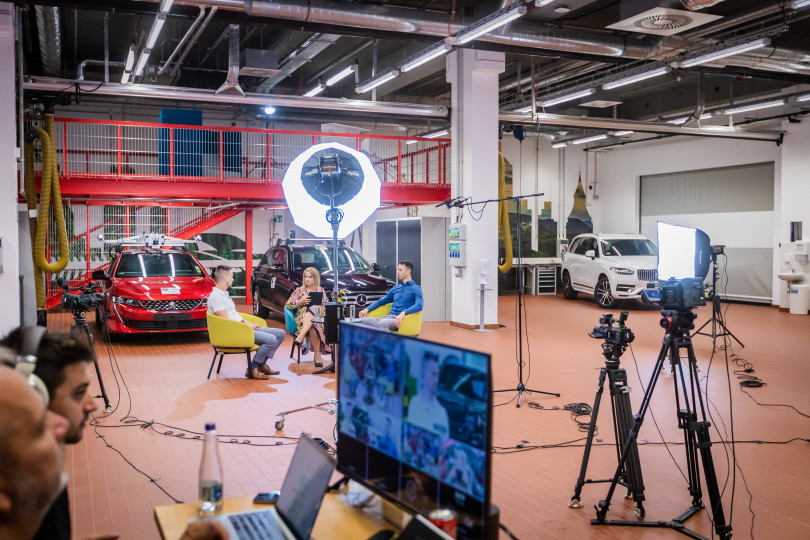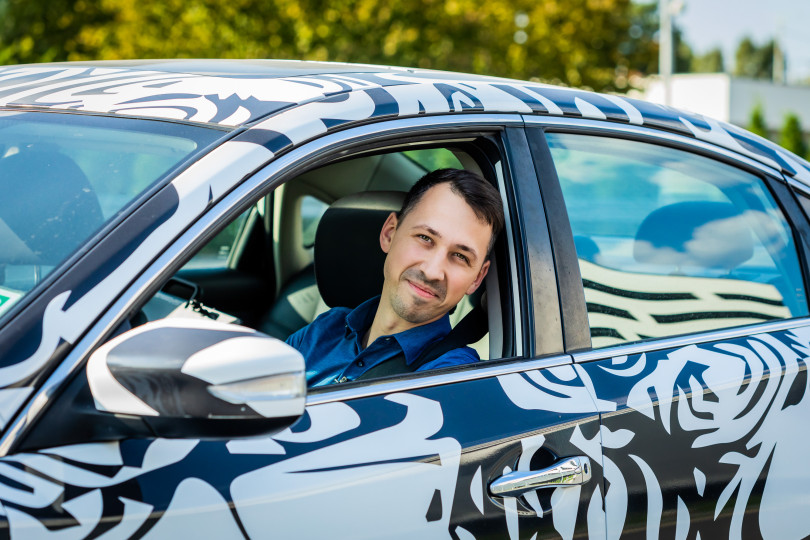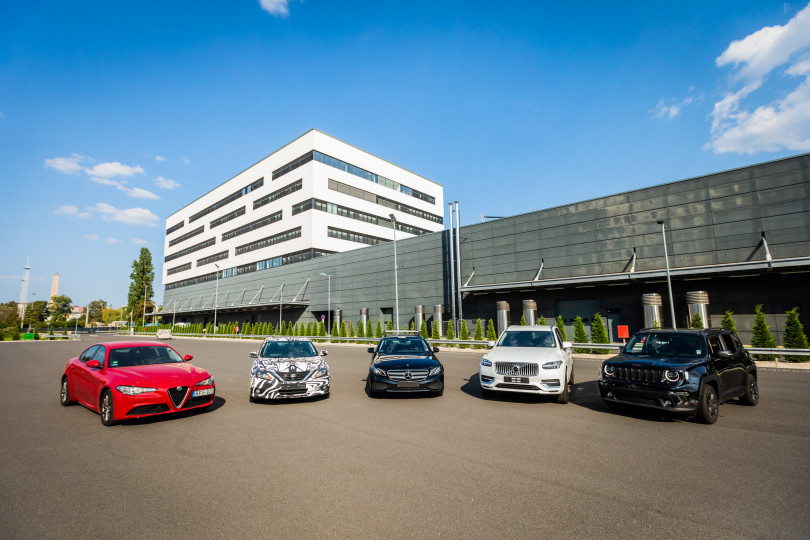Bosch’s Engineering Center Budapest is home to a number of ground-breaking automotive developments to make driving safer and more comfortable. Parking assistance systems are one of the most useful extras, and Bosch experts are already developing vehicles in Budapest that can park themselves without human intervention. This requires exhaustive testing and rigorous ‘training’ of the cars. The secrets of the cars of the future are revealed in this edition of the Bosch Hungary Podcast, which focuses on the most exciting current questions in the development of parking solutions.
Parking is one of the boogeymen of driving, whether you’re a novice or an experienced driver. Our cars are getting bigger, the urban environment is increasingly crowded and unpredictable, and one wrong maneuver can cause significant financial damage or even personal injury. The Bosch Engineering Center Budapest is the home of the latest special edition of the Bosch Hungary Podcast, where more than 200 engineers are working on parking systems to make parking as safe and stress-free as possible. They are helped by a fleet of around 100 test vehicles and a 10,000 square meter fully equipped vehicle verification area at the company’s Budapest site. Is automated parking offered as standard equipment a distant dream? How are parking systems being developed? How extensively are cars being modified for testing? Márk Tóth, team leader for test vehicle development at Bosch, and Dániel Montvai, development group manager, talk to Edit Tóth, digital media manager of the Bosch Group in Hungary, who is testing the company’s state-of-the-art parking solution.
Stress-free parking? Spoiler: yes!
In the latest episode of the Bosch Hungary Podcast, we get an insight into the work of one of Europe’s most modern automotive complexes, the Bosch Engineering Center Budapest, where much of the automotive development in Hungary takes place, and find out how cutting-edge parking solutions are created. “According to EU statistics, almost half of all accidents resulting in material damage occur while parking or maneuvering slowly,” says Dániel Montvai when asked about the reasons behind Bosch’s developments in this area. The company’s aim is to use its latest automated parking solutions to ensure that parking is safe anywhere, in any environment, without leaving blind spots, and that other road users, such as pedestrians, are also safe.
Safety will no longer be a luxury
Since 2022, parking assistance systems are mandatory in all new cars in the European Union. The solutions offered cover a wide spectrum, they range from basic ultrasonic rear sensors and rear-view cameras to automatic parking systems in premium cars, which Bosch is currently working on simplifying and making it even more user-friendly. With the fully automatic solution, parking is just a push of a button for the driver, as the car finds the parking space and performs the necessary maneuvers with the help of 12 ultrasonic sensors and 4 cameras. According to Dániel Montvai, this system will be available not only in luxury cars in five years’ time, and Bosch’s aim is to make the developments as widely available as possible. He believes that, although automated driving is still a long way off, automated parking systems are already on their way as a first step in the process.
Camouflaged cars, kilometer-long harnesses and specially trained drivers – a tour of Bosch’s ‘test vehicle empire’
The operation of an advanced parking system can be divided into three stages. The first step is to map the environment using sensors, be it with camera images or a map generated from ultrasonic reflections. In the second stage, the software interprets and puts these into context. The final reaction, i.e. braking or steering, is based on all the available information. For the development of parking systems, thorough testing is very important to ensure that the vehicle can perceive its surroundings as accurately as possible. This is facilitated by the 10,000 square meters of vehicle verification space on the Bosch Budapest Innovation Campus. Here you can find a wide variety of road surfaces, covered with asphalt or cobblestones, and even potholed areas simulating very bad roads, various curbs and even train tracks.
Bosch’s domestic test fleet of around 100 cars, including both production cars and prototypes camouflaged with zebra-print wrap film, is managed by a dedicated team. Márk Tóth and his colleagues are responsible for making sure that the cars are modified to meet the needs of the testers. This means fitting different cameras, special probes and even lidar sensors. These sensors are used to capture and process an incredible amount of data, roughly one gigabyte per second, using artificial intelligence solutions. In the podcast, Márk also reveals that during a more complex, months-long conversion, they had to ‘stuff’ more than 3 kilometers of cable into one of the test cars, because that was needed for that specification.
However, the team leader responsible for the test vehicles also points out that the modification of the cars must be carried out very carefully, as nothing can cause an emergency in real urban tests. Equally important is the regular training of the test drivers, with various specialized driving courses, as they need to be prepared for any unexpected situation.
Bosch Hungary Podcast: technology in plain language
The Bosch Hungary Podcast deals with the most current issues in innovation and R&D, seeks to provide clear answers to the most pressing questions about the technology of the future with the help of expert guests. If you want to learn more about the latest Bosch developments in parking, you can listen to the answers and even watch them on Bosch Hungary’s podcast channels on Youtube, Spotify, Apple Podcasts, and Simplecast!
Zita Hella Varga
Phone: +36 70 667-6374
Bosch has been present in Hungary since 1898 with its products. After its re-establishment as a regional trading company in 1991, Bosch has grown into one of Hungary’s largest foreign industrial employers with currently eight subsidiaries. In fiscal 2023 it had total net sales of 2.207 billion forints and consolidated sales to third parties on the Hungarian market of 343 billion forints. The Bosch Group in Hungary employs more than 18,300 associates (as of December 31, 2023). In addition to its manufacturing, commercial and development business, Bosch has a network of sales and service operations that covers the entire country.
The Bosch Group is a leading global supplier of technology and services. It employs roughly 429,000 associates worldwide (as of December 31, 2023). The company generated sales of 91.6 billion euros in 2023. Its operations are divided into four business sectors: Mobility, Industrial Technology, Consumer Goods, and Energy and Building Technology. With its business activities, the company aims to use technology to help shape universal trends such as automation, electrification, digitalization, connectivity, and an orientation to sustainability. In this context, Bosch’s broad diversification across regions and industries strengthens its innovativeness and robustness. Bosch uses its proven expertise in sensor technology, software, and services to offer customers cross-domain solutions from a single source. It also applies its expertise in connectivity and artificial intelligence in order to develop and manufacture user-friendly, sustainable products. With technology that is “Invented for life,” Bosch wants to help improve quality of life and conserve natural resources. The Bosch Group comprises Robert Bosch GmbH and its roughly 470 subsidiary and regional companies in over 60 countries. Including sales and service partners, Bosch’s global manufacturing, engineering, and sales network covers nearly every country in the world. Bosch’s innovative strength is key to the company’s further development. At 136 locations across the globe, Bosch employs some 90,000 associates in research and development, of which nearly 48,000 are software engineers.
Additional information is available online at www.bosch.hu, iot.boschblog.hu, www.bosch.com, www.iot.bosch.com, www.bosch-press.com, www.twitter.com/BoschPresse

